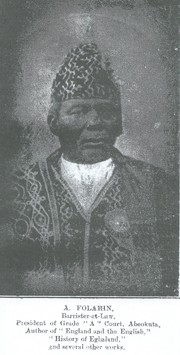Adebesin Folarin
A. O. Payne, Mr. and Mrs. J. J. Thomas, Richard Beale Blaize, Mr. N. T. B. Shepherd and James Johnson (Assistant Bishop of Western Equatorial Africa).The tribal wars of the early 19th century forced the Egba people to migrate from their homesteads and seek refuge under the Olumo Rock in Abeokuta, where they established a new settlement.Towards the end of his time in England, Folarin wrote a book entitled "England and the English: Personal Impressions during a Three Years' Sojourn" which was published by John Taylor in London and was dedicated to his cousin, Eric O. Moore, "in the confident hope that he will spare no effort to collaborate in fostering in our race those elements of unity and self-respect which are so essential to national progress and national independence".The book painted a vivid (and complementary) picture of England as a place, the English people, their mode of government, habits and pastimes.We are told that the smallest State in Europe has produced its heroes, men of arts and letters, and that of all the world Africa (Negro-land) alone has failed.We had our heroes, we have our men of arts, but no history to record and immortalise their fame – no monument to inspire the rising generation with the valorous spirit of their ancestors.[13]Folarin also saw embracing Egba culture, including names, language and dress, as important aspects of cultivating a sense of patriotism: We have constituted ourselves the greatest race of imitators and fetish worshippers that ever existed on the globe.[13]In doing so, Folarin represented the new, post-Victorian generation of young Nigerians who were deeply patriotic, nationalistic and focused on the advancement of Egba culture.The sense of patriotism that Folarin developed while he was in England inspired him to spend his later career in Abeokuta, the capital of Egbaland, rather than pursuing a legal career in Lagos or a political position on the national level, unlike his friends and classmates the Alakijas or his cousin Eric O. Moore, who went on to occupy prominent positions in national politics.At a meeting of the Lagos Auxiliary of the Anti-Slavery and Aborigines Rights Protection Society on 1 September 1919, he gave a speech in which he stated the following: We have known a long time ago that there are different kinds of people and different countries in the world.Folarin was one of the founding members of the Abeokuta "Reform Club", which was established in 1915 to assist the Egba United Government restore and preserve peace in Egbaland.Folarin argued that the only way to remedy the issues which were causing significant social unrest, was peaceful lobbying by constitutional means: This fact again is incapable of comprehension to the illiterate masses except to the educated few.It is therefore highly essential for the illumination of the darkness of the masses that they be brought into close contact with the enlightened elements of the community so that they may understand and know that reform could be advocated for and grievances complained of, not by beating the drum and ringing the tocsin, not by brandishing sticks and machetes and uproariously parading the streets, but by constitutional means, by force of reason and by public opinion.The Reform Club held political meetings both publicly and privately to discuss political questions and ventilate grievances.Folarin was one of two individuals accompanying Alake Ademola on the dias during his coronation (the other being J. O. George, judge in the Ake Native Court).He wrote a stinging critique of Mr Justice Pennington's judgments in Saka Agoro v. Barikisu Osi Epe and Adisatu Morenikeji [1920] Supreme Court Suit No.This doctrine so industriously propounded time after time by Mr Justice Pennington whenever any action relating to women's rights to property comes before the Court is not only listened to with bewilderment by the native community owing to its exoticism but it is tremblingly apprehended that if it is allowed to be imbibed by the male sex of this clime its germination will have no other result but the pernicious severance of the sacred tie which binds a family together[24]Folarin argued that native law and custom recognizes equality of rights between male and female children.Following a successful legal and political career, in 1929 he was appointed as the President of the Grade "A" Customary Court in Abeokuta, a position which he held until his retirement on pension in 1941.The following was written about him by an unknown author in the Lagos Standard edition dated 26 January 1916: Writing of this gentleman reminds me of how, in his school days, it used to be his hobby to challenge his classmates to a display of their knowledge of English.[25]Folarin was also a keen musician, and contributed to the musical entertainment at a number of high profile events including a dinner held in honour of his cousin, Eric O. Moore, at St. George's Hall, Lagos, on 2 March 1917.





Colonial and Indian ExhibitionRichard Beale BlaizeJames Johnson (Assistant Bishop of Western Equatorial Africa)Samuel Ajayi CrowtherFrederick Rotimi WilliamsAkintola WilliamsKofoworola AdemolaOyinkansola AbayomiJohn TaylorErnest ShonekanCMS Grammar School, LagosLadapo AdemolaLady AdemolaAdeyemo AlakijaAfrican Times and Orient ReviewAdeyemoMiddle TempleRichard Akinwande Savage